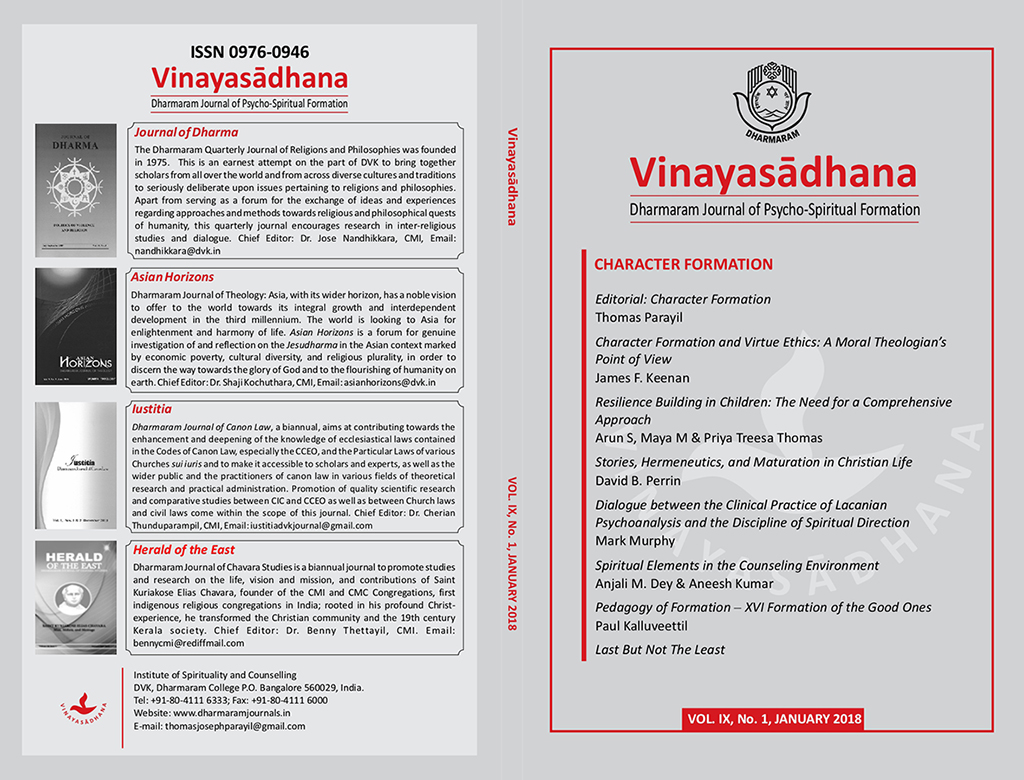Dialogue between the Clinical Practice of Lacanian Psychoanalysis and the Discipline of Spiritual Direction
Keywords:
Lacanian Psychoanalysis, Spiritual Direction, ChristianAbstract
This paper explores Lacan’s engagement with the Christian Practice of Spiritual Direction. I examine what he has said directly within his writings about the practice and move from there to explore how we should approach a dialogue between the two disciplines of Psychoanalysis and Spiritual Direction. This is a dialog which has never taken place as Lacan seems to be excluded from the majority of practical writings on the subject of Spiritual Direction and its relationship to Psychology. In exploring this absence of dialog,I discover that modern therapeutic methods and Spiritual Direction both share ‘experiential foundations’ and a dual repression of the Mystical element which shut it off from a Lacanian approach. Moreover, I will argue that it is only through recovering this repressed Mystical element that a dialog between Lacanian Psychoanalysis and Spiritual Direction becomes possible.
References
Barry, W. A., & William J. C. (2009). The practice of spiritual direction (2nd ed.). New York: Harper One.
Beattie, T. (2013). Theology after postmodernity: Divining the void—A Lacanian reading of Thomas Aquinas. Oxford: OUP Oxford.
Binkley, S. (2014). Happiness as enterprise (1st ed.). New York: State University of New York.
Brooks, G. (2014). Five orthodox words I wish everyone knew. Orthodox Christian Network (blog). Retrieved from http://myocn.net/five-orthodox-words-wish-everyone-knew/.
Brown, P. (1998). The body and society. Suffolk: Faber and Faber.
Carrette, J., & King, R. (2004). Selling spirituality: The silent takeover of religion (1st ed.). New York: Routledge.
de Certeau, M. (2015). The mystic fable, Volume Two: The sixteenth and seventeenth centuries. (L. Giard, Editor). (M. B. Smith, Trans.). Chicago: University Of Chicago Press.
Chiesa, L. (2007). Subjectivity and otherness. Cambridge: MIT Press.
Chiesa, L. (2016). The not-two: Logic and God in Lacan (1st ed.). Cambridge, Massachusetts: The MIT Press.
Fink, B. (1997). A clinical introduction to Lacanian Psychoanalysis: Theory and technique. London: Harvard University Press.
Fink, B. (2013). Against understanding, Volume 2: Cases and commentary in a Lacanian Key. Routledge.
Fink, B. (2015). Lacan on love: An exploration of Lacan’s Seminar VIII, Transference. Malden, MA: Polity Press.
Galindo, I. (1997). Spiritual direction and pastoral counseling: Addressing the needs of the spirit. Journal of Pastoral Care & Counseling: Advancing Theory and Professional Practice through Scholarly and Reflective Publications, 51(4), 395–402. https://doi.org/10.1177/002234099705100403.
Harborne, L. (2012). Psychotherapy and spiritual direction: Two languages, one voice? London: Karnac Books.
Hillman, J. (1977). Re-Visioning psychology. New York, NY: HarperCollins Publishers.
Hollywood, A. (2002). Sensible ecstasy: Mysticism, sexual difference, and the demands of history. London: University of Chicago Press.
Lacan, J. (2006). Ecrit: The first complete edition in English (2nd ed.). New York: W W Norton & Company, Inc.
Lacan, J. (1988). The seminars of Jacques Lacan book I: Freud’s papers on technique 1953-1954 (1st ed.). New York: W.W Norton.
Lacan, J. (1993). The Seminars of Jacques Lacan Book III The Psychoses 1955-1956. J. A. Miller (Ed.) (1st ed.). London: Routledge.
Lacan, J. (1999). The Seminars of Jacques Lacan Book XX: On Feminine Sexuality The Limits of Love and Knowledge 1972-1973. J-A. Miller (Ed.) (2nd ed.). New York: W.W Norton & Company.
Lacan, J. (1969). The Seminars of Jacques Lacan XVI. C. Gallagher (Ed.). Dublin: Lacan in Ireland.
Lane, B. C. (1998). The solace of fierce landscapes: Exploring desert and mountain spirituality. Oxford: Oxford University Press.
Louth, A. (2003). The Wilderness of God. Darton: Longman & Todd.
Mathews, I. (1995). The Impact of God (1st ed.). London: Hodder and Stoughton.
McGinn, B. (2017). Mysticism in the Golden Age of Spain. The Crossroad Publishing Company.
McGowan, T. (2004). The end of dissatisfaction? Jacques Lacan and the emerging society of enjoyment (1st ed.). New York: Sate University of New York Press.
McGrath, A. E. (2013). Christian Spirituality: An Introduction. Hoboken, NJ: Wiley.
Merton, T. (1960). The Wisdom of the Desert (1st ed.). New York: Sheldon Press.
Merton, T. (2013). Thomas Merton - Spiritual Direction and Meditation. Collegeville, Minnesota: The Order of St. Benedict, Inc.
Nobus, D. (2000). Jacques Lacan and the Freudian practice of Psychoanaylsis (1st ed.). London: Brunner-Routledge.
Parker, I. (2011). Lacanian Psychoanalysis: Revolutions in Subjectivity. K. Tudor (Ed.) (1st ed.). New York: Routledge.
Péguy, C. (2001). Temporal and Eternal. Indianapolis, IN: Liberty Fund.
Pound, M. (2011). Lacan’s Return to Freud: A Case of Theological Ressourcement? In The Oxford Handbook for Ressourcement Theology (1st ed.). Oxford: Oxford University Press.
Pound, M. (2007). Theology psychoanalysis and trauma. London: SCM Press.
Roazen, P. (2001). The trauma of Freud: Controversies in psychoanalysis. New Brunswick: Transaction Publishers.
Salecle, R. (1998). The silence of feminine Jouissance. In Sic 2: Cogito and the Unconcious, (1st ed.), 175–96. North Carolina: Duke University Press.
Soler, C. (2015). Lacanian affects (1st ed.). New York: Routledge.
Stevens, A. (2007). Love and sex beyond identification. In The later Lacan: An introduction. V. Voruz (Ed.) (1st ed.), 211–21. Albany: State University of New York Press.
Turner, D. (1995). The darkness of God: Negativity in Christian mysticism (1st ed.). Cambridge: University Press.
Tyler, P. (2011). The Return to the Mystical: Ludwig Wittgenstein, Teresa of Avila and the Christian Mystical Tradition (1st ed.). London: Continuum.
Ward, B. (2003). The desert fathers: Sayings of the early Christian Monks. UK: Penguin.
Žižek, S. (1998). Cogito and the Unconscious: Sic 2. Durham: Duke University Press.


